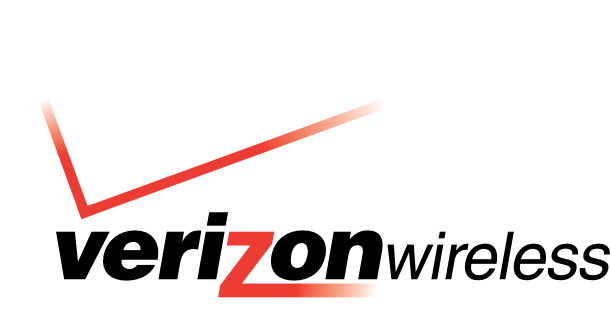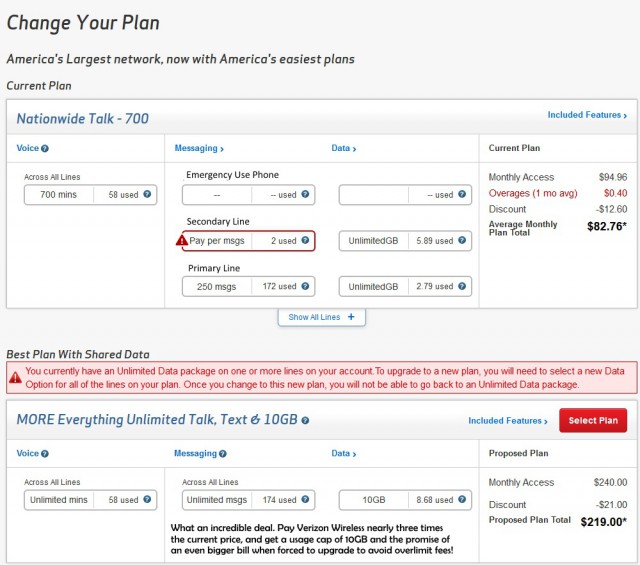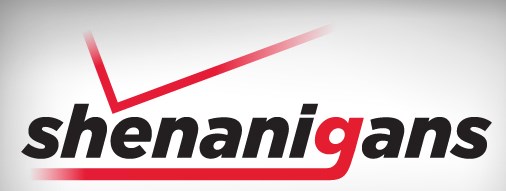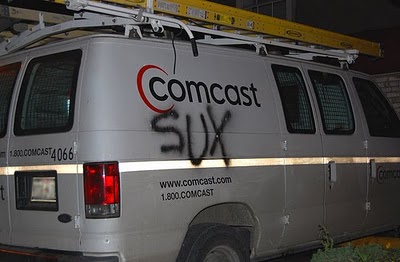 Verizon Wireless is closing several loopholes that customers have used to acquire new subsidized, on-contract smartphones and keep their unlimited data plans intact for an extra two years.
Verizon Wireless is closing several loopholes that customers have used to acquire new subsidized, on-contract smartphones and keep their unlimited data plans intact for an extra two years.
Since Verizon Wireless stopped enrolling customers in unlimited use data plans in 2012, current customers have been able to hang on to their unlimited use plans with the understanding they will not be entitled to subsidized upgrades or new lines with unlimited data. Despite that, Verizon still aggressively pursues unlimited data customers at almost every contact encouraging them to ditch their unlimited plan in favor of much more profitable Family Share plans, which feature usage-based billing tiers that customers will need to regularly upgrade to stay ahead of increasing data usage trends.
A study from Consumer Intelligence Research Partners showing Verizon has successfully convinced all but 22% of their customers to dump their unlimited plans. Those still hanging on guard their unmetered plans zealously. Some have even managed to find loopholes that let them keep unlimited data while getting subsidized device upgrades. But Verizon has caught on and is slowly closing the loopholes, increasing restrictions on unlimited data plan customers.
The Loopholes
One of the newer loopholes is a type of subsidized upgrade through Best Buy. A number of careful steps are required to win the upgrade without changing your data plan, and there are several side effects explained exhaustively on the Slickdeals website. If you try, read the instructions very carefully or you could lose your unlimited plan. The upgrade has been successful for many who have kept their unlimited packages, signed a new two-year contract exempting them from Verizon Wireless’ 4G speed throttle, and getting a new device at a subsidized discount. it won’t be easy to tell when this loophole is closed, and you might have to fight to win back your unlimited data package if it is removed from your account.
Another loophole involves shifting upgrades around on your current family plan. As different family members become eligible for device upgrades, it is possible to an upgrade to an existing number with an unlimited data plan without losing that feature. This is the most popular loophole at the moment and the one Verizon Wireless wants to kill the most.

“Tina, bring me the axe!”
Verizon Takes the Axe to Loopholes, Discounts, and Finance Plans for Unlimited Data Customers
Verizon has declared a virtual war on their grandfathered unlimited data plan customers, and has gradually tightened the noose:
- Verizon Wireless will begin throttling 4G/LTE speeds of off-contract, unlimited data plan customers deemed heavy users who consume more than 4.7GB of data per month beginning this fall;
- On July 13, Verizon Wireless quietly terminated its Device Payment Plan for unlimited data customers seeking to finance the cost of an unsubsidized device upgrade over 12-20 months. Instead, customers must enroll in Verizon Edge to get a phone with little cash upfront and monthly payments. One of the conditions of the Edge program is forfeiting your unlimited data plan;
- Verizon will no longer allow customers with unlimited data plans to transfer an available device upgrade from another line on the account to get a subsidized device upgrade while keeping their unlimited data plan.
In the past, some customers who love upgrading devices a lot either grabbed other family members’ device upgrade offers or opened up extra lines on the account. For each additional $9.99 a month basic line, a customer could qualify for a new subsidized device with a two-year contract, initially attaching a basic 2GB $30/month data plan they can immediately drop when the phone is switched to a line with unlimited data. Some customers have even maintained two or three unused phantom lines just so they can upgrade their phone every 10 months or so.
Beginning Aug. 24, Verizon will close that loophole by forcing customers to keep a data package associated with every subsidized device on their account for the length of the contract. This means customers must pay at least $30 for a 2GB data package, plus the usual $9.99 a month fee for service over the next two years for each line with a smartphone attached, regardless of what number it gets associated with.
According to information received by Droid Life, Verizon believes that when it “gives customers a discount on the retail price of a smartphone, we expect them to pay for data services and keep the smartphone activated for two years. This change closes the loopholes which allowed customers to activate/upgrade a smartphone and immediately revert back to a basic phone, resulting in a discontinued smartphone with no associated data plan.”

Here’s an offer I’d like to refuse: This may explain why Verizon Wireless is so gung-ho about getting customers to switch to their “money-saving” Family Share Plan. In fact, it’s a Family Theft plan — nearly three times more expensive with a data cap that will force even more upgrades at a higher cost in the future.


 Subscribe
Subscribe
 Verizon Wireless’ ongoing campaign to get rid of its grandfathered unlimited data customers continues this week with news the carrier will begin throttling speeds of off-contract customers still hanging on to their uncapped data plans starting Oct 1.
Verizon Wireless’ ongoing campaign to get rid of its grandfathered unlimited data customers continues this week with news the carrier will begin throttling speeds of off-contract customers still hanging on to their uncapped data plans starting Oct 1. “My phone has been throttled and is now essentially unusable for the very things it is marketed for,” reports one customer sentenced by Verizon’s “Network Optimization.” “
“My phone has been throttled and is now essentially unusable for the very things it is marketed for,” reports one customer sentenced by Verizon’s “Network Optimization.” “ With Verizon unwilling to budge, Google has stepped in with $150 Visa gift cards for all affected customers to make up for Verizon’s stinginess and broken promises.
With Verizon unwilling to budge, Google has stepped in with $150 Visa gift cards for all affected customers to make up for Verizon’s stinginess and broken promises.
